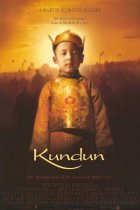
Kundun Page #11
- PG-13
- Year:
- 1997
- 134 min
- 1,147 Views
A knock.
TAKTRA RINPOCHE (OC)
Enter.
The Regent is next door.
The boy climbs up on a chest and peeks through a tiny window
in the wall which separates this enclosure from the
Regent's.
Taktra Rinpoche reads a telegram. His aging
The Regent leaves his side of the enclosure.
REGENT (OC)
Summon the Lord Chamberlain and
the Kashag.
And then, there is a knock on the Dalai Lama's door.
TENZIN GYATSO:
Enter.
It is the Regent.
REGENT TAKTRA:
Holiness.
TENZIN GYATSO:
Yes.
REGENT TAKTRA:
The Chinese have invaded.
EXT. GARDENS, NORBULINKA DAY
Back to a new group of performers - satirists, dressed as
high lamas and monks - even as the Nechung Oracle -
lampooning the rulers. The crowd roars with laughter.
INT. DALAI LAMA'S PRIVATE ROOMS, NORBULINKA DUSK
The Lord Chamberlain stands with the teenage Dalai Lama.
The room is a violent red in the sunset.
Tenzin Gyatso has cleared off his table, he is creating a
three-dimensional battlefield as his Lord Chamberlain
explains the situation. Tenzin Gyatso uses papers, books,
little statues to bring a physical life to the words we
hear.
LORD CHAMBERLAIN
They crossed the river, Holiness.
They have invaded in six locations,
Chando Province, Kham, eastern Tibet.
TENZIN GYATSO:
What is the size of our army, now?
LORD CHAMBERLAIN
Eight thousand, five hundred,
soldiers and officers.
We have recently requested mortars,
anti-aircraft guns and ammunition
from India. We have several hundred
in the area.
Little statues are placed facing what stands-in for the
river.
The Lord Chamberlain helps the boy to create this panorama.
TENZIN GYATSO:
Has anyone died?
LORD CHMBERLAIN:
officer had died. Then he
they are coming."
And then, the radio went dead.
Tenzin Gyatso lifts one statue, a small, golden Buddha, from
the display. He cradles the Buddha in his hands.
TENZIN GYATSO:
One man. A man has died.
One man is too many.
INT. DALAI LAMA'S PRIVATE ROOMS, NORBULINKA DAY
In beautiful sunlight, the painted cabinets of this room
glisten. Rainbows of color play on the glass windows. The
Dalai Lama sits at a low table, a pack of colored pencils,
or pastels, spread out around him. He is teaching his
little brother to draw.
Together, little hand in bigger hand, they draw.
The Dalai Lama's Mother sits in a side chair, watching her
sons.
The little boy screams with laughter as the brothers draw a
yak.
EXT. GARDENS, NORBULINKA NIGHT
A movie is being shown - outside - on a makeshift screen.
It is "Henry the Fourth".
This is a treat for the sweepers, and gardeners and
servants. children sit on the grass, mesmerized by this
incredible vision.
Tenzin Gyatso sits beside Heinrich Harrer.
The boy rubs his eyes wearily. He appears distracted.
This line is spoken by an actor:
ACTOR IN MOVIE:
"Heavy lies the head, that
wears the crown."
CLOSE on Tenzin Gyatso.
EXT. ROAD BEHIND NORBULINKA DAY
The Dalai Lama sits behind the wheel of a 1927 Austin. He
is a lousy driver - a boy who never commanded a wheeled
vehicle in all of his young life.
The Attendants sit in the back seat, holding on for dear
life.
We hear Tenzin Gyatso's wonderful, deep laugh.
INT. DALAI LAMA'S PRIVATE ROOM, THE POTALA NIGHT
Tenzin Gyatso is listening to Peking Radio. Norbu Thundrup
is with him.
The boy tinkers with a clock as he listens - he is swiftly
becoming a master tinkerer.
RADIO:
"This week, the People's
Liberation Army crossed the Drichu
River east of Chamdo and began
the peaceful liberation
of Tibet.
Tibet is in the hands of
imperialist enemies of
the people. The Dalai
Lama, a foolish reminder
of an illiterate past,
is the figure head of
this autonomous region
of China. Accept our
help, Tibet! The people
shall be free!"
TENZIN GYATSO:
What do the people say, Norbu?
Norbu is not shy in his report.
NORBU THUNDRUP:
Tibetan officials have retreated from
Chamdo. They are scared and
running. The Chinese strategy has
destroyed the heart of our defense
forces. Chamdo falls, several other
villages are lost. You know what
happens. The road to Lhasa will be
wide open.
Tenzin Gyatso listens carefully to the man.
NORBU THUNDRUP:
The people want you made Dalai Lama.
TENZIN GYATSO:
Then, I am lucky.
I am still too young.
NORBU THUNDRUP:
These are dangerous times.
They want the Dalai Lama to lead
them.
TENZIN GYATSO:
But, I have no experience.
NORBU THUNDRUP:
Oh, but you do, Kundun.
Who else would be here?
INT. DALAI LAMA'S PRIVATE ROOMS, THE POTALA NIGHT
The Nechung Oracle spins in his trance. Horns blow, cymbals
clash, the Oracle spurts sounds as lamas chant.
Finally, the Oracle approaches the boy, stands beside him,
like a lieutenant, a comrade, and says:
ORACLE:
"His time has come."
The Dalai Lama is reading - Tibet's appeal to the United
Nations.
TENZIN GYATSO:
"To the members of the United
Nations:
riveted on Korea where aggression
is being resisted by an international
force. Similar happenings in remote
Tibet are passing without notice.
The problem is not of Tibet's
own making but is largely the outcome
of unthwarted Chinese ambition
to bring weaker nations on her
periphery within her active
domination."
This is very good. Quite strong.
The Lord Chamberlain and the four members of the Kashag
agree.
The boy continues:
TENZIN GYATSO:
"Tibetans have for long lived a
cloistered life in their mountain
fastness, remote and aloof..."
In the background, we see monks on top of a wall, long horns
in front of them. The blowing begins.
In a courtyard below, a debating session is in progress. We
hear the shouts and the claps and watch the beautiful body
movements of the questioners. Laughter fills the air.
Below that, the small capital of Tibet - the mysterious
city, the forbidden city of Lhasa - carries on, for now.
INT. DALAI LAMA'S PRIVATE ROOMS, THE POTALA NIGHT
A monk - an abbot, in fact - sits beside Tenzin Gyatso.
It is Takster Rinpoche, the Dalai Lama's oldest brother.
TAKSTER RINPOCHE
I was never alone. Two Chinese
were with me every minute of the day.
Tenzin Gyatso plays with a box of those special sweets which
comes from his mother.
TAKSTER RINPOCHE
Their talk is always of liberation
and helpfulness. They put their
words like honey on a knife, but if
you lick the honey, you will bleed.
Takster Rinpoche begins to say something, but holds back.
TENZIN GYATSO:
Tell me.
TAKSTER RINPOCHE
They think they have convinced me.
They think I am on their side.
They have allowed me to leave Kumbum
and come to Lhasa believing that I
will try to turn you to their ways.
If I do not succeed, I am to
eliminate you.
TENZIN GYATSO:
You, kill me?
TAKSTER RINPOCHE
Eliminate you.
The tension is great, the idea profound.
TARSTER RINPOCHE
I can be Governor of Lhasa,
they say.
Translation
Translate and read this script in other languages:
Select another language:
- - Select -
- 简体中文 (Chinese - Simplified)
- 繁體中文 (Chinese - Traditional)
- Español (Spanish)
- Esperanto (Esperanto)
- 日本語 (Japanese)
- Português (Portuguese)
- Deutsch (German)
- العربية (Arabic)
- Français (French)
- Русский (Russian)
- ಕನ್ನಡ (Kannada)
- 한국어 (Korean)
- עברית (Hebrew)
- Gaeilge (Irish)
- Українська (Ukrainian)
- اردو (Urdu)
- Magyar (Hungarian)
- मानक हिन्दी (Hindi)
- Indonesia (Indonesian)
- Italiano (Italian)
- தமிழ் (Tamil)
- Türkçe (Turkish)
- తెలుగు (Telugu)
- ภาษาไทย (Thai)
- Tiếng Việt (Vietnamese)
- Čeština (Czech)
- Polski (Polish)
- Bahasa Indonesia (Indonesian)
- Românește (Romanian)
- Nederlands (Dutch)
- Ελληνικά (Greek)
- Latinum (Latin)
- Svenska (Swedish)
- Dansk (Danish)
- Suomi (Finnish)
- فارسی (Persian)
- ייִדיש (Yiddish)
- հայերեն (Armenian)
- Norsk (Norwegian)
- English (English)
Citation
Use the citation below to add this screenplay to your bibliography:
Style:MLAChicagoAPA
"Kundun" Scripts.com. STANDS4 LLC, 2024. Web. 26 Dec. 2024. <https://www.scripts.com/script/kundun_890>.



Discuss this script with the community:
Report Comment
We're doing our best to make sure our content is useful, accurate and safe.
If by any chance you spot an inappropriate comment while navigating through our website please use this form to let us know, and we'll take care of it shortly.
Attachment
You need to be logged in to favorite.
Log In